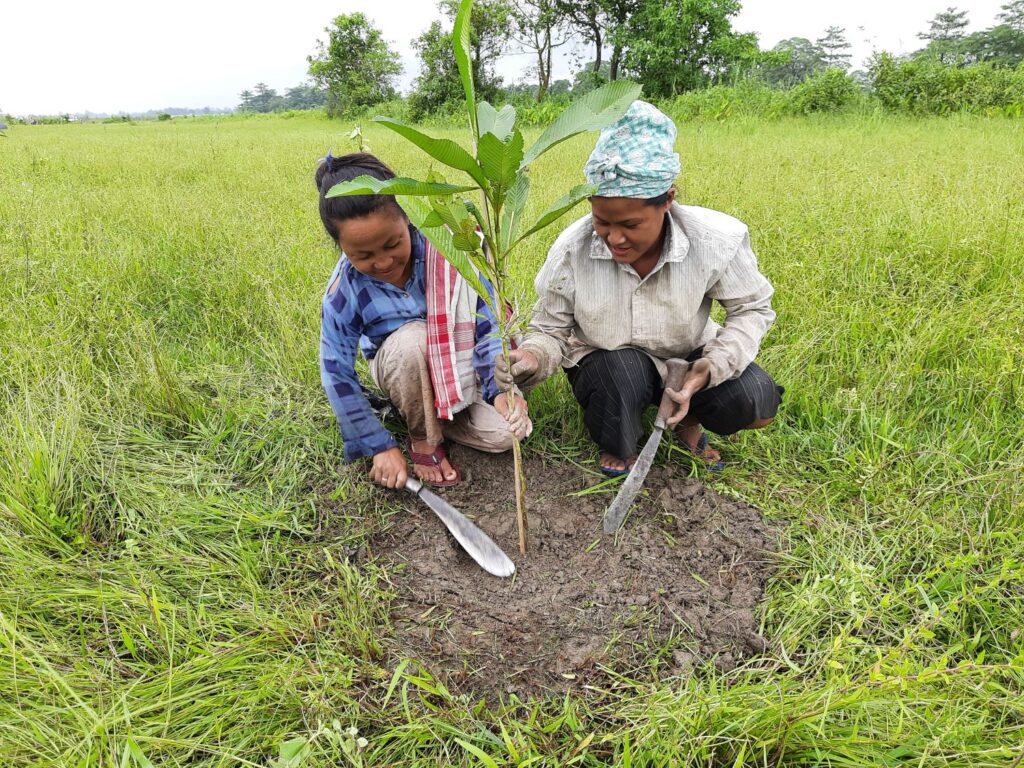We are excited to share an update from our Plant a Tree project with conservation partner Wildlife Trust of India (WTI). Supported by generous donations to the Plant a Tree programme, WTI is restoring degraded riverine forest habitat within the D’ering Dibru Saikhowa Corridor.
A community tree nursery at Namsing village. Credit: WTI
138,082 saplings planted
To restore degraded land within the corridor, WTI have planted 138,082 saplings over 180 hectares (445 acres) using 34 native tree species. Alongside tree planting, WTI carried out grassland restoration, planting species such as Cogon Grass (Imperata cylindrica) and Alpinia nigra.
To support planting efforts, WTI set up two community-managed nurseries in the villages of Mer and Namsing, which will provide saplings for restoration and a site for future education opportunities for local school children.
Tree planting requires careful attention to detail, all the way from seed to tree. In the last quarter, WTI collected over 5,000 seeds, drying and storing these prior to planting in the community nursery. Credit: WTI
Elephants spotted at the restoration sites
At the Mer and Paglam restoration sites, there has been an increase in elephant activity, with both footprints, dung, and sightings. They already appear to be benefiting from the increased forest cover at these planting sites.
Laying the foundation for other developments
Beyond restoring critical habitat through Plant a Tree support, WTI have also been working with local communities to create sustainable livelihoods that minimise reliance on forest products. This has included supporting women to turn handloom weaving into a reliable source of income, by making and selling traditional clothing like shawls, sarongs, and scarves.
In 2025, WTI distributed seven quintals of yarn (equivalent to 700 kg) to 120 women from 30 groups within Mer and Paglam. This support aims to strengthen weaving as a sustainable source of income for the community. Credit: WTI
To assess the impact of their livelihood support activities, WTI carried out a survey in the villages of Mer, Namsing, and Paglam. The survey’s results provide fantastic support in favour of their efforts:
- Over 60% of families reported an annual income increase of more than 40%.
- More than 70% of community members participated in project activities.
- Between 2024 and 2025, 58 people received training in fisheries development, textiles, and animal husbandry.
Wildlife sightings
WTI have also deployed 10 camera traps across D’ering-Dibru Saikhowa National Park in January and May, capturing many species including the Khalij Pheasant (Lophura leucomelanos), Large Indian Civet (Viverra zibetha), Asiatic Black Bear (Ursus thibetanus), and Leopard Cat (Prionailurus bengalensis).
A Large Indian Civet (Viverra zibetha) caught on camera in the D’ering Dibru Saikhowa Corridor. Solitary and nocturnal, the Large Indian Civet is an opportunistic hunter and preys on small mammals. Credit: WTI
Together, these actions are shaping a brighter future for both wildlife and people in India.
You too can make a difference by supporting restoration through WLT’s Plant a Tree programme. Every tree planted helps restore extraordinary habitat and protect the incredible biodiversity that calls it home.

